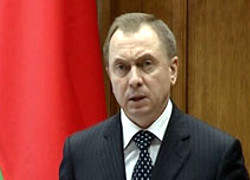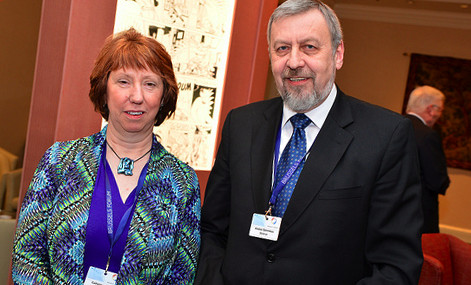Exchanging Makiei to Swedish Ambassador
- 19.03.2013, 12:12

The removal of visa restrictions from the black-listed officials is not linked to the release of the political prisoners.
The leader of the civil initiative European Belarus Andrei Sannikov said about it in an interview to charter97.org,
On March 16 the presidential candidate of the 2010 elections, former political prisoner Andrei Sannikov took part in the 8th Brussels Forum, an annual international event that gathers influential politicians from Europe and the U.S.
- Andrei Olegovich, you represented Belarus at the Brussels Forum after a two-year break when you were in jail. What are your impressions?
- For me, it was a special conference, because it was the first time after a long break when I met with my friends who had been worrying about me, my family, about what is happening in Belarus. Even in jail I could feel their support.
My impressions are very ambivalent: a range of dynamic processes are happening in Europe, even in our region, but we cannot participate in these processes because of the dictatorship. It is obvious that Lukashenka doesn’t have any role to play in Europe, although it is his great ambition.
Belarus is frozen in a dead time, and it’s a shame, to put it mildly. On the other hand, it should be noted that such aspects as the democratic development and enhancement of democratic institutions have not lost their significance. On the contrary, I believe that the events of 2010 in Belarus have pushed the Euro-Atlantic community to a more serious discussion of the situation in authoritarian and dictator states. The situation in Belarus has affected the establishment of a new European foundation in support of democracy.
- In your speech you criticized the West for the lack of strategy regarding Belarus. What was the reaction?
- Western politicians admit that there is no strategy. Once in two-three years their politics become softer after a harder period, but that’s all that happens. I had an opportunity to talk to many influential politicians, public figures, journalists, analysts. Naturally, I was speaking to them about the situation in Belarus, about the urge to release the political prisoners, about the need for a strategy for the democratic world regarding Belarus and similar cases.
In fact, the discussions about a strategy were very effective because we talked not only about how we should react to the roughest violations of the human rights in Belarus, but even about ways to influence the situation itself, and the tools that the democratic world possesses. These discussions have given good food for thought and I hope that they will be resumed in the near future.
- Whom have you met in Brussels?
- I met with High Representative of the Union for Foreign Affairs & Security Policy Catherine Ashton. I told her about the inhuman pressure that the political prisoners endure in Belarus, and urged her to take more decisive measures to assist their release. She confirmed the principle position of the European Union regarding the political prisoners.

I also met with and talked to Estonia’s president Toomas Hendrik Ilves, deputy Secretary of State of the U.S. Wendy Sherman, foreign minister of Lithuania Linas Linkiavicius, minister of defense of Latvia Artis Pabriks, former president of Serbia Boris Tadic, minister of defense of Georgia Irakli Alasania, chairperson of the Committee on Foreign Affairs of Bundestag Ruprecht Polenz, deputy foreign minister of Poland Jerzy Pomianowski, leaders of American and European think tanks, and many others. There have been lots of meetings.
- What do European politicians say about Belarusian foreign minister Uladzimir Makiei, barred from entering the EU?
- I was concerned with the fact that the removal of visa restrictions from the black-listed officials is linked not to the release of political prisoners, but to other issues, like for example the return of the Swedish Embassy to Minsk. Unfortunately I didn’t get the chance – due to technical or maybe some other problems - to talk to Sweden’s foreign minister Carl Bildt who was also there. But linking the visa restrictions to this issue will simply reveal Europe’s weakness and give the dictatorship additional opportunities for blackmailing. First deport the ambassador, and then get him back in exchange for the “black list”.
- What steps can Belarus expect from Europe today?
- If you mean Europe’s attitude to Belarus, then I would say that Europe has no hopes or plans regarding Lukashenka. And therefore Europe has no orientation on the incumbent powers. There can be attempts to restore certain contacts, but I would say that it is not even about Europe being disappointed and tired of the dictatorship’s stupid stubbornness. This regime is treated as dead meat.
Another thing is that Europe has not had a serious discussion about the toolkit that can be used to affect the situation of Belarus. And here we should talk not only about sanctions that must be in place and that are completely legit for the release of political prisoners, but also about the opportunities that Europe can offer Belarus. We succeeded in starting a discussion about free-of-charge multi-entrance visas for Belarusians, about creating more spots for both university-level and post-graduate education.
I believe that this is where Europe’s strategy for Belarus can be based: putting a thick screen in front of the dictatorship and opening for common people of Belarus.










